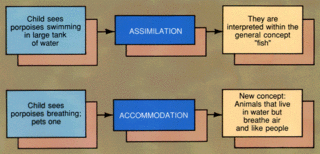Piaget's Cognitive-developmental theory
Sensorimotor Stage
Schemes
Assimilation and Accomodation

Circular Reactions
 Object Permanence
Object PermanenceA-not-B search error
deferred imitation
functional play
make-believe play
violation-of expectation method
Infant memory
Recognition and recall
Infantile amnesia
Autobiographical memory
Vygotsky's Zone of Proximal Development
Infant Intelligence Tests
Bayley Scales of Infant Development
Mental scale and motor scale
Developmental Quotient
Home Observation for Measurement
Language Development
Behaviorist perspective
Nativist perspective
language acquisition device
Interactionist perspective
Cooing and babbling
joint attention
underextension
overextension
telegraphic speech
child-directed speech
Erikson's basic trust versus mistrust
autonomy versus shame and doubt
basic emotions
social smile
stranger anxiety
separation anxiety
social referencing
self-conscious emotions
emotional self-regulation
Temperament
Easy, difficult, and slow-to-warm-up children
inhibited and uninhibited children
goodness-of-fit model
attachment


Ainsworth's Strange Situation
secure attachment
avoidant attachment
resistant attachment
disorganized/disoriented attachment
Attachment Q-sort
fathers, siblings and child care
attachment and later development
I-self and me-self
empathy
self-control
compliance
Physical Growth in Early Childhood
Handedness
Dominant Cerebral Hemisphere
Nightmares and Sleep Terrors
Eating habits in early childhood
Gross and fine motor skills
Preoperational thought
sociodramatic play
dual representation
operations
egocentrism (link)
animistic thinking
conservation (link link)
centration
irreversibility
hierarchical classification
class inclusion problem (link)
Understanding death
1. permanence
2. universality
3. nonfunctionality
Piaget and Early Childhood Education
1. Discovery learning
2. Sensitivity to children's readiness to learn
Vygotsky and private speech
Scaffolding
Vygotsky and Early Childhood Education
Information Processing
Planning
Memory strategies
Episodic memory
scripts
Metacognition
Theory of Mind
Ordinality and cardinality
Power Point
Physical Knowledge in Infancy
Obituary of Urie Bronfenbrenner
The Nature of Love by Harry F. Harlow (1958)

<< Home